EMA Recommends Arpraziquantel for Treatment of Schistosomiasis in Preschool-Aged Children
15.12.2023
Arpraziquantel, developed by the Pediatric Praziquantel Consortium, receives positive scientific opinion by the European Medicines Agency for the treatment of schistosomiasis in preschool-aged children. The Consortium's work to develop, register, and provide access to arpraziquantel is a tangible contribution to the elimination of schistosomiasis as a public health problem. As a member of the consortium, Swiss TPH conducted the clinical trials together with local partners.

The EMA recommendation is a major milestone in fighting the burden of schistosomiasis in young children. Photo: Alexis Martin, Swiss TPH
Today, the Pediatric Praziquantel Consortium announced that the Committee for Medicinal Products for Human Use (CHMP) of the European Medicines Agency (EMA) adopted a positive scientific opinion for arpraziquantel to treat the neglected tropical disease, schistosomiasis, in preschool-aged children (3 months to 6 years of age). The application was submitted by the company Merck, on behalf of the Consortium, under the EU-M4all procedure for high-priority medicines for human use intended for countries outside the European Union.
Schistosomiasis (also known as bilharzia) is one of the most prevalent parasitic diseases worldwide and a very important one in terms of public health burden and economic impact. It is a poverty-related disease that is widespread in tropical and subtropical regions where large sections of the population have no access to clean water and improved sanitation. The infection rate is particularly high among children.
A treatment for young children
Arpraziquantel contains the pharmacologically active enantiomer of praziquantel, the standard of care treatment for schistosomiasis developed in the 1970s. Extending the range of options for the treatment of schistosomiasis, arpraziquantel is tailored for use in preschool-aged children. It is a 150 mg tablet that withstands the hot and humid challenges presented by a tropical climate. The tablet is administered by dissolving it in water and has an improved taste to make it more palatable for very young children.
The positive CHMP scientific opinion by EMA is the basis for the potential inclusion of arpraziquantel into the World Health Organization’s list of prequalified and essential medicinal products. Together with the positive scientific opinion, the planned prequalification will support the regulatory pathway in African countries. In Brazil, regulatory submission is planned by Consortium partner, Farmanguinhos. As the federal governmental pharmaceutical laboratory of the Fiocruz Foundation in Brazil, Farmanguinhos brings expertise in production and distribution and will be the manufacturing site for the future introduction of the new pediatric medication in endemic countries. The partnership with Universal Corporation Ltd., Nairobi, Kenya is also supporting the planned future large-scale local production to serve African countries.
Swiss TPH clinical trial expertise in hard to reach populations
Swiss TPH has been a member of the Pediatric Praziquantel Consortium from the very beginning. It led the implementation of the clinical trials in Tanzania, Côte d'Ivoire and Kenya, where schistosomiasis is endemic. “This is a major milestone in fighting the burden of schistosomiasis. In the past, when a preschool-aged child was sick, there was no suitable medicine. Now, we have a tested, efficacious and safe medicine for this age group,” said Eric Huber, Project Leader of the clinical trials at Swiss TPH. “I am proud that, together with our in-country partners, we have been able to demonstrate that conducting clinical trials that meet the EMA's high quality standards is possible in spite of the difficult conditions in the remote, rural areas affected by the disease. From setting-up and building infrastructure, clinical trial know-how and capacity strengthening to project management and monitoring, the results demonstrate that with expertise and teamwork, it is possible to bring science to remote areas and improve evidence-based care."
Getting the treatment to patients
In parallel with this regulatory work, the Consortium’s implementation research programme (ADOPT), which is co-led by Swiss TPH and Unlimit Health, is currently ongoing, preparing for the introduction of arpraziquantel in the first endemic countries in Africa. To support equitable and sustainable access, it is essential that new procurement and funding mechanisms are collaboratively explored and established. The intent is to make the product available on a not-for-profit basis in sub-Saharan African countries.
Diseases of poverty, like schistosomiasis, must be overcome in order to deliver on the United Nations’ Sustainable Development Goals (SDGs) and ensure universal health coverage. By developing, registering and providing access to arpraziquantel, the Consortium is making a tangible contribution to the elimination of schistosomiasis as a public health problem and thereby also addressing the SDGs, in particular SDG 3 (Good Health and Wellbeing) and SDG 17 (Partnerships for the Goals).
“We have reached a critical milestone, but the journey is not yet over. We must now go the last mile, bringing treatment to young patients in need,” said Peter Steinmann, public health specialist and coordinator of the ADOPT programme at Swiss TPH.
Contact

Eric Huber
MSc
Project Leader
+41612848972
eric.huber@swisstph.ch
Stay connected
Subscribe to our newsletter and get all the latest research news, project updates, course and event listings from Swiss TPH.